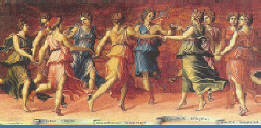

Poems Without Frontiers
Poems in Translation
| Victor Hugo 1802- 1885 | |
|---|---|
|
Son of a senior army officer, Hugo accompanied his family in their frequent travel but
he settled at an early age with his mother in Paris and absorbed her royalist outlook
rather than his father's republican views. He later became increasingly sympathetic to
republicanism and social change, however, being elected to the assembly in 1848; but, from 1851,
he chose exile in Brussels and the Channel Islands during the reign of Napoleon III
returning to France only in 1870.
|
|